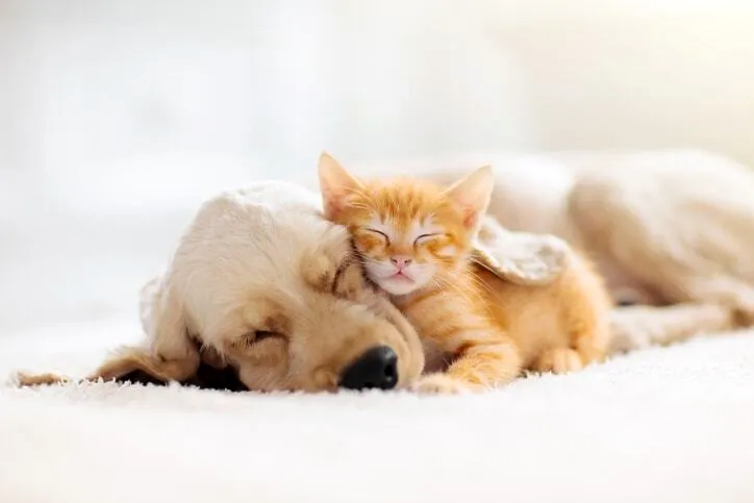
Pets are not immune to stress, and as caring pet owners, it’s crucial to recognize the subtle cues that indicate our furry friends might be feeling overwhelmed. Stress in pets can manifest in various ways, affecting their behavior and physical health. In this detailed guide, we’ll explore 20 common signs of stress in pets, providing insights into understanding and managing their well-being effectively.
Read More: How to Keep Pets Safe During this Winter?
Common Signs of Stress in Pets

Definition of stress in pets
Stress in pets is a natural response to changes or challenges in their environment. This can include anything from moving to a new home, changes in routine, or even encounters with other animals. Recognizing stress is vital for ensuring the overall health and happiness of our pets.
Importance of identifying stress in pets
Identifying stress early allows pet owners to intervene and provide support, preventing long-term health issues. Stress management is crucial for fostering a positive and balanced life for our pets.
Behavioral Signs of Stress
Changes in eating habits
One of the most noticeable signs of stress in pets is a change in eating habits. This can manifest as a loss of appetite or, conversely, overeating as a coping mechanism. Observing these changes is essential for understanding emotional distress.
Excessive grooming or self-mutilation
Pets, particularly cats, may resort to excessive grooming or even self-mutilation when stressed. This behavior is often a response to anxiety or environmental changes that need attention.
Aggression or withdrawal
Stressed pets may exhibit either aggression or withdrawal from social interactions. Recognizing these behavioral changes is crucial for understanding the underlying causes of their stress.
Increased vocalization
Excessive barking, meowing, or other vocalizations can be a pet’s way of expressing stress. This heightened communication indicates a need for attention or comfort.
Physical Signs of Stress
Digestive issues
Stress can have a direct impact on a pet’s digestive system, leading to issues such as diarrhea, vomiting, or constipation. Monitoring changes in their bathroom habits is vital for early intervention.
Changes in sleep patterns
Alterations in sleep patterns, such as insomnia or excessive sleeping, may indicate stress affecting a pet’s overall well-being. Understanding their typical sleep behavior is crucial for identifying deviations.
Skin problems
Stress can manifest in physical symptoms like skin problems, including excessive itching or fur loss. Prompt veterinary attention is necessary to address these stress-related skin conditions.
Respiratory changes
Stress can exert physical strain on a pet’s body, leading to respiratory changes such as labored breathing or rapid respiratory rates. These signs require immediate attention from a veterinarian.
Environmental Triggers
New surroundings
Pets may struggle to adapt to new environments, experiencing stress until they become familiar and comfortable. Gradual introductions and creating a safe space can help ease this transition.
Loud noises
Sudden loud noises, such as fireworks or thunderstorms, can trigger stress responses in pets. Providing a quiet, secure space during such events can alleviate their anxiety.
Lack of routine
Changes in daily routines, like feeding times or walks, can disrupt a pet’s sense of security, leading to stress. Maintaining consistency in their daily lives helps mitigate this form of stress.
Interactions with other pets
Unpleasant interactions with other animals, whether in the household or outside, can cause stress and impact a pet’s social and emotional well-being. Monitoring these interactions is vital for their overall happiness.
Coping Mechanisms for Pets

Creating a safe space
Providing a designated safe space allows pets to retreat and feel secure when stressed. This refuge is essential for them to escape overwhelming stimuli and regain a sense of calm.
Providing mental stimulation
Engaging pets with toys, puzzles, or interactive activities helps alleviate boredom and mental stress. Mental stimulation is as crucial as physical exercise for their well-being.
Regular exercise and playtime
Physical activity is a fundamental aspect of stress relief, promoting a healthy balance between mental and physical well-being. Regular playtime and exercise contribute to a happy and stress-free pet.
Veterinary consultation
Consulting with a veterinarian is crucial for identifying the root cause of stress. A professional can offer tailored advice and management plans based on the individual needs of the pet.
Common Misconceptions about Pet Stress
Pets don’t experience stress
Contrary to popular belief, pets do experience stress. Recognizing and addressing it is essential for their overall health and happiness.
Stress is always negative
While stress can be detrimental, it also serves as a natural response, prompting pets to adapt to changes in their environment. Understanding the nuanced nature of stress is crucial for effective management.
Only major changes cause stress
Minor disruptions in routine or subtle environmental changes can also trigger stress in sensitive pets. Being attuned to these nuances is key to proactive stress management.
Stress doesn’t affect physical health
Untreated stress in pets can lead to severe health issues, emphasizing the importance of proactive management. Mental and emotional well-being directly impact physical health.
Recognizing Stress in Different Pets
Dogs
Signs of stress in dogs may include excessive barking, destructive behavior, or changes in appetite. Understanding these cues helps tailor stress management strategies for dogs.
Cats
Stressed cats may exhibit hiding behaviors, excessive grooming, or changes in litter box habits. Recognizing these signs allows for targeted stress relief interventions.
Birds
Feather plucking, loss of appetite, or excessive squawking can signal stress in birds. Observing these behaviors is vital for their well-being.
Small mammals
Rabbits, hamsters, and guinea pigs may display changes in eating habits, lethargy, or aggression when stressed. Tailoring stress management to their specific needs is crucial.
Tips for Pet Owners
Understanding individual pet needs
Each pet is unique, and understanding their individual preferences and triggers is crucial for effective stress management. What works for one may not work for another.
Consistency in routine
Maintaining a consistent daily routine provides stability and a sense of security for pets. Predictability is reassuring for them and helps reduce stress.
Monitoring behavioral changes
Regularly observing and addressing any changes in behavior ensures timely intervention and support. Proactive monitoring is key to effective stress management.
Seeking professional help when needed
If signs of stress persist, consulting a veterinarian or professional animal behaviorist is vital for comprehensive guidance. Professional input ensures a tailored approach to addressing specific stressors.
Case Studies
Real-life examples of pets dealing with stress
Exploring case studies provides insight into the real challenges pets face and the successful strategies employed by pet owners to manage stress.
Successful stress management stories
Inspiring stories of pets overcoming stress showcase the positive impact of dedicated care and intervention. These success stories offer hope and practical guidance for pet owners facing similar challenges.
Conclusion
Recap of key points
Identifying and addressing stress in pets is a crucial aspect of responsible pet ownership. Proactive stress management contributes to their overall well-being, ensuring a happy and balanced life.
Importance of proactive stress management
Proactive stress management is the key to a happy, healthy life for pets. It fosters a strong bond between owners and their companions, creating an environment where pets can thrive emotionally and physically.
Read More: How To Improve Pets Digestion?
FAQs
- Can pets get stressed? Yes, pets can experience stress due to various factors, and recognizing the signs is vital for their well-being.
- How can I help my stressed pet at home? Creating a calm environment, providing mental stimulation, and maintaining a consistent routine are effective ways to support a stressed pet.
- When should I consult a veterinarian about my pet’s stress? If behavioral or physical signs of stress persist or worsen, seeking professional advice from a veterinarian is recommended.
- Are there specific breeds more prone to stress? While individual temperament varies, certain breeds may be more sensitive to stress; however, any pet can experience it.
- Can stress in pets lead to long-term health issues? Untreated stress in pets can contribute to various health problems, underscoring the importance of proactive management and intervention.







